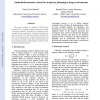Free Online Productivity Tools
i2Speak
i2Symbol
i2OCR
iTex2Img
iWeb2Print
iWeb2Shot
i2Type
iPdf2Split
iPdf2Merge
i2Bopomofo
i2Arabic
i2Style
i2Image
i2PDF
iLatex2Rtf
Sci2ools
101
Voted
RECONFIG
2008
IEEE
2008
IEEE
Embedded Harmonic Control for Trajectory Planning in Large Environments
This paper presents an embedded FPGA–based architecture to compute navigation trajectories along a harmonic potential. The goals and obstacles may be changed during computation. Large environments are split into blocks. This approach, together with the use of an increasing precision, enables an optimization of the overall computation time that is theoretically and experimentally studied. Implementation results confirm outstanding speedup factors.
Embedded Fpga–based Architecture | Outstanding Speedup Factors | Overall Computation Time | RECONFIG 2008 | Reconfigurable Computing |
Related Content
| Added | 01 Jun 2010 |
| Updated | 01 Jun 2010 |
| Type | Conference |
| Year | 2008 |
| Where | RECONFIG |
| Authors | Cesar Torres-Huitzil, Bernard Girau, Amine M. Boumaza, Bruno Scherrer |
Comments (0)

